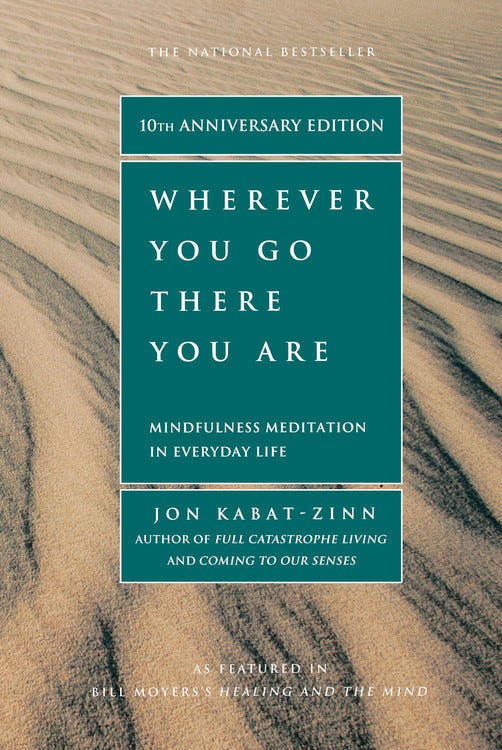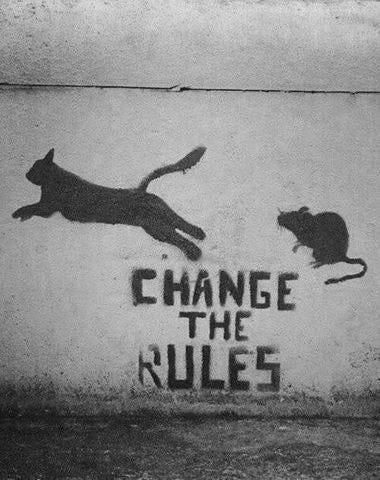Do the Opposite - how to stop worrying and start meditating, Telegram channel and more!
Hello everyone,
Welcome to the newest issue of the Do the Opposite newsletter, sent every Monday! If you like it, please share this link with your friends: https://tinyletter.com/dotheopposite
If you want to share any resources, articles, books or anything else with the community, please reply to this email with your recommendations!
_________
On Meditation
Meditation has helped me in a difficult period of my life and that's the reason I want to share with you my experience with it. It helped me stop mental loops of worrying, but I think it is a great tool to address any issues you might experience in your life - especially the stress-related ones. I am not talking about the spiritual side of meditation (that's up to each individual to figure out for themselves) but of the practical value even 10-15 minutes of it can bring. I was absolutely shocked by the speed of the positive changes it brought at the time - mental clarity and calm. Some time after that I did this write-up of the story that I want to share:
"In my personal life, there was a period when I was constantly worried about the future, my family's health and safety and the world at large. I tried to stop thinking these thoughts, tried to prove to myself logically that I was exaggerating, that there is nothing to be afraid of, but the more I tried the more I kept thinking those thoughts of worry. [After 1-2 months of this,] I’ve met a person named William at one of the freeCodeCamp meetings here in Toronto and he told me that meditation could help with my problems. He recommended I read “Wherever You Go, There You Are”. I’ve started reading it and meditating right away. I’ve stopped thinking the ‘worry’ thoughts after 3(!!!) days of meditation. Ever since, I regularly meditate and I have an enormous respect and reverence for the process."
Here's the book that taught me all I needed to know to start using meditation in practice: "Wherever You Go, There You Are." by Jon Kabat-Zinn I know the title sounds a bit 'out there' but don't let that fool you, Jon gives priceless practical advice in the book. I am thinking of rereading it later this year.

If you want to learn more about meditation and to try it out, you can check out the resources on this page
If you are looking for a distraction free, amazing Meditation app and you are on iOS, I recommend "Oak". https://www.oakmeditation.com - that's the one I use. Also, check out Calm and Headspace.
On Telegram Channel
I've been sharing Do the Opposite - themed resources on a public Telegram channel for quite a bit now, but I've realized I almost never mentioned it anywhere. The things I share there are a bit more sporadic and random in nature than in this newsletter, I generally use it as a "notebook" of sorts, to keep all the things that align with the ethos of Do the Opposite together and to provide members of the community with that info instantaneously.
There will be interesting articles, videos, tweets, images, interactive websites and more that will not always fit into the newsletter, and if you would like "to keep your hand on the pulse" of everything DTO (Do the Opposite), join the channel. Here is the link!
Articles:
1) "The Willingness to Think Differently" by Leo Babauta
I've had this article bookmarked for years now, and I keep going back to reread it once in a while. I think that the "willingness to challenge mainstream ideas" as Leo puts it is a quality that all the people who want to live life by their own rules must have. It's always awkward, embarrassing and scary to stand out and tell the society that you want to do this or that differently - be it eating vegetarian diet, or dropping out of school, or moving to a different city, or changing careers, etc. It's almost never welcomed by cheers and ovation; usually others are so stuck in the 'tunnel vision' of what a person should do and how they should live, that the best reaction you can hope for from them is confusion. That's why it's so important to cultivate self-reliance and trust your own instincts.
2) "Stop That 80-Hour Hustle" by Aytekin Tank
I am very tired of reading praises of the hustle culture, about people who are forcing themselves to work 80-100 hours per week in order to achieve some ephemeral level of 'devotion' or to prove how ambitious they are. I believe in smart work, proper relaxation/sleep time. That's another area of life where I believe you should do the opposite. As an example of that, to me, the person who works 30 hours a week making $5K per month is way ahead of another who works 90 hours a week and gets $20K. That optimization of effort to outcome is what I find fascinating and worth emulating.
DHH (David Heinemeier Hansson), creator of Basecamp and Ruby-on-Rails, is one of the people of whom I can say they are "doing the opposite". He is very vocal on Twitter, criticizing the hustle culture (and more). I recommend all of the Basecamp's books: "Remote", "Rework", "It doesn't have to be crazy at work", "Getting Real".
Ethos:

Quote:
Nobody made a greater mistake than he who did nothing because he could do only a little.
– Edmund Burke
How does a project get to be a year behind schedule? One day at a time.
– Fred Brooks, software engineer and computer scientists
AK: Phew, that was a lot, and you got through it! :) Thanks for reading!
_________
BONUS: Do the Opposite also has a public Telegram channel. The content there is shorter, a bit more random (basically anything weird or interesting that catches my eye) - articles, tweets, videos, images etc. Hope to see you there as well! :) Here it is: https://t.me/dotheopposite
If you find this newsletter helpful, please consider forwarding it to a friend! Or just give them this link: https://tinyletter.com/dotheopposite
Keep doing the opposite,
Alexander Kallaway
https://twitter.com/ka11away

